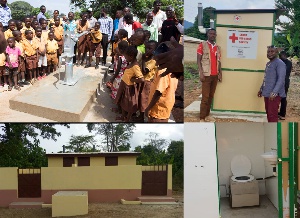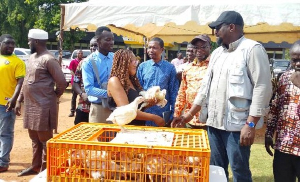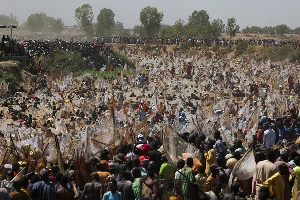Clean Water, Sanitation, and Hygiene (WASH) are basic elements of life and enablers of healthy living. In various households, communities, and schools, the absence of these enablers affect health, nutrition and wellness, productivity and may even contribute to child mortality.
While there have been improvements over the past decades, about “4.5 billion people still live without a safe toilet and 892 million people still practice open defecation”, according to the United Nations. The World Health Organization (WHO) also estimates that some 842,000 people die each year from preventable conditions like diarrhoea resulting from unsafe drinking-water as well as poor sanitation and hand hygiene.
As today marks World Toilet Day, it is important to raise awareness about the challenges and the actions needed to curb the problem. In Central and West Africa, Nestlé guided by its purpose of “Enhancing Quality of Life and Contributing to a Healthier Future”, has an ambition to help improve 30 million livelihoods in communities directly connected to its business activities by 2030. This ambition is evident in the company’s global partnership with the International Federation of the Red Cross and Red Crescent Societies (IFRC) where Nestlé has helped over 300,000 dwellers in rural and farming communities with Water, Sanitation and Hygiene Services in Cote d’Ivoire and Ghana.
Access to properly managed sanitation help children stay in school and learn better. Contributing to this, Nestlé under its WASH program in schools have provided more than 200 sanitary facilities and hygiene awareness program across Central and West Africa benefitting over 7,000 schoolchildren. This contributes to SDG 4 (Quality Education).
“Many people including children in Africa have lost their lives as a result of preventable diseases due to lack of water and sanitary facilities and poor hygiene practices. Having footprints across Central and West Africa for 60 years, we believe that we have a role to play to build resilient communities and help people lead healthier lifestyle”, Remy Ejel, Market Head of Nestlé Central and West Africa said.
According to Dr. Fatoumata Nafo-Traore, Director of IFRC, Africa Region, “We are leading a major shift to better address the needs of women and people with disability through guidelines on female friendly as well as disability friendly latrines. We have to get the balance right and make sure that everyone who receives water also has access to a safely managed toilet.
We are ensuring that homes, schools and health centres have toilets that are clean, functional and used by everyone in the community”. She thanked Nestlé for the partnership and urged other institutions to emulate.
Irene Anuwa-Armah is a Deputy Director of Public Health and Nursing Services at the Eastern Regional Municipal Health Directorate which is a beneficiary of the WASH project. Sharing how the project has benefited the Esikasu community, she said “I want to appreciate Nestlé and IFRC for bringing the WASH project to the communities and our facility. It will go a long way to help community members and also improve health care as patients will now get adequate and convenient toilet when they visit”.
Ensuring availability and sustainable management of water and sanitation for all (Sustainable Development Goal 6) by 2030 is possible by working together with government, civil society, and private sector to enable the population have access to adequate sanitary and water infrastructure and empower everyone to live a healthy lifestyle.
General News of Monday, 19 November 2018
Source: Nestle Ghana Ltd













